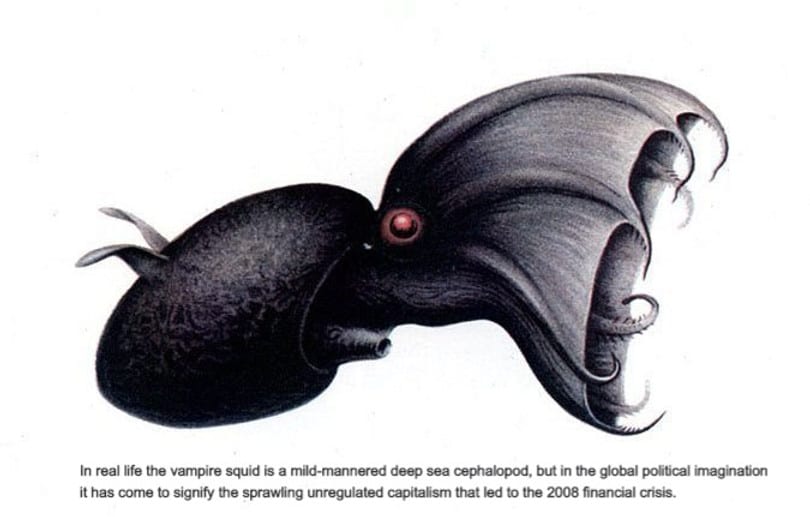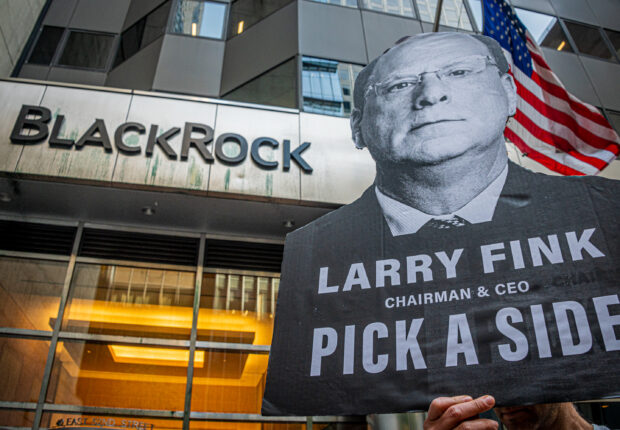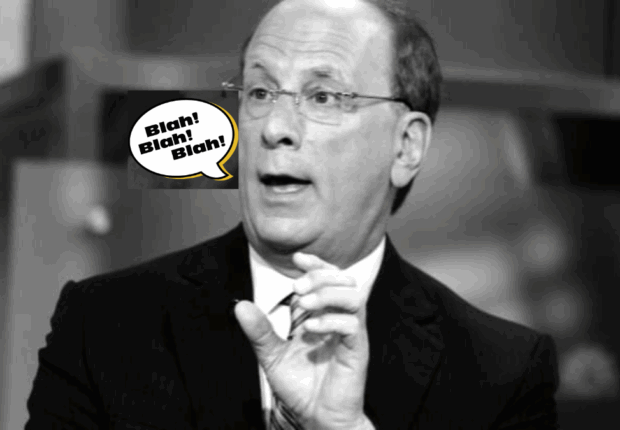As the world's largest asset manager grows in financial and political power around the world, critics are dubbing BlackRock the "vampire squid" and saying it is the heir to Goldman Sachs' former position as the most hated behemoth of the financial services industry.

With its new contract from the U.S. Federal Reserve to run the bond buyback program which aims to prevent the economy from crashing due to the pandemic, BlackRock has become, observers argue, what Goldman was leading up to the financial crash of 2008 — too big to fail, too big to regulate, and deeply embedded with government insiders.
In short, a big problem. Here’s what Matt Tiabbi wrote about Goldman, 10 years ago:
“The first thing you need to know about Goldman Sachs is that it’s everywhere. The world’s most powerful investment bank is a great vampire squid wrapped around the face of humanity, relentlessly jamming its blood funnel into anything that smells like money. In fact, the history of the recent financial crisis, which doubles as a history of the rapid decline and fall of the suddenly swindled dry American empire, reads like a Who’s Who of Goldman Sachs graduates.” The Great American Bubble Machine: Rolling Stone, Matt Taibbi, April 2010
And financial analyst Ellen Brown last week:
“While the public was distracted with protests, riots and lockdowns, BlackRock suddenly emerged from the shadows to become the “fourth branch of government,” managing the controls to the central bank’s print-on-demand fiat money.“
Brown continues, “To most people, if they are familiar with it at all, BlackRock is an asset manager that helps pension funds and retirees manage their savings through “passive” investments that track the stock market. But working behind the scenes, it is much more than that. BlackRock has been called “the most powerful institution in the financial system,” “the most powerful company in the world” and the “secret power.” It is the world’s largest asset manager and “shadow bank,” larger than the world’s largest bank (which is in China), with over $7 trillion in assets under direct management and another $20 trillion managed through its Aladdin risk-monitoring software.
BlackRock has also been called “the fourth branch of government” and “almost a shadow government”, but no part of it actually belongs to the government. Despite its size and global power, BlackRock is not even regulated as a “Systemically Important Financial Institution” under the Dodd-Frank Act, thanks to pressure from its CEO Larry Fink, who has long had “cozy” relationships with government officials.” “Meet BlackRock, the New Vampire Squid”,/ CounterPunch, Ellen Brown, June 24, 2020
In The New Republic, Kate Aronoff tracks BlackRock’s evolution from hugely successful money manager to hugely influential steward of the bond buyback program at the Federal Reserve, a crucial part of the American pandemic response.
“BlackRock is having a very good pandemic. The world’s largest asset manager has been tapped by the Federal Reserve to oversee three expansive government debt-buying programs meant to stave off economic catastrophe and is expected to make $48 million a year doing so. Of the exchange-traded funds, or ETFs, the Fed has purchased so far via this arrangement, about half have been BlackRock’s own, though the company will generously credit any income earned in those purchases back to the central bank. An even more full-throated merger of BlackRock and state could be on the horizon as CEO Larry Fink cozies up to Joe Biden’s presidential campaign, likely angling for a top Cabinet post. Whatever the result of the November election, BlackRock is poised to come out a winner.”
BlackRock on Climate Change
In January, BlackRock CEO Larry Fink released his hotly anticipated annual letter with a bombshell that echoed around the financial world – BlackRock claimed it was putting climate action at the center of its business model.
Aroniff reports, “While these promises were praised by business journalists and even some climate groups, climate campaigners who had been tracking the firm were more skeptical. Even under the long list of sustainability measures BlackRock claims to be adopting, it will still be free to continue being a major investor in both fossil fuels and deforestation. A corrective, says Amazon Watch’s Moira Birss, is pretty simple: “Make fossil-free and deforestation-free the default. Right now, if you are a BlackRock client, the thing they’re offering you is full of climate-destroying companies. That’s a decision by BlackRock to make climate-destroying companies part of its default offering. It could make the decision to do the opposite”.
“Amazon Watch is part of a coalition of green groups and corporate campaigners called BlackRock’s Big Problem, which since 2018 has drawn attention to the firm’s investments in companies fueling climate destruction through fossil fuels and deforestation. Working in partnership with Indigenous tribes in South America, Amazon Watch found in a 2019 report that BlackRock was one of the top investors in the agribusiness firms responsible for deforestation in the Amazon, with over $2.5 billion worth of shares of those companies. Under pressure, BlackRock has made vague commitments to engage with companies around deforestation and Indigenous rights, but tribes say they’ve seen few results,” reports Aronoff.
BlackRock’s team, like the Goldman Sachs executives before it, have their sights set on bigger prizes than just dominating the global investment sector, Aronoff describes.
“The firm has become a kind of safe haven for ex-Obama staffers, ready to feed future administrations with talent that hasn’t been tainted by stints at more despised companies like Goldman Sachs (the original vampire squid) or JPMorgan Chase. Fink himself may be angling for a position in a Biden administration. “We suspect,” The Wall Street Journal’s editorial board noted last month, “his foremost goal is to be Joe Biden’s Treasury Secretary.” Brian Deese—another BlackRock executive and former senior adviser to Barack Obama—has also been rumored to be in the running for a plum post. The group’s climate and energy work is headed by Rhodium partner Trevor Houser, who served in the Obama administration and as Hillary Clinton’s top adviser on climate and energy.” “Is BlackRock the New Vampire Squid?” The National Review, Kate Aronoff,June 26, 2020.
Richard Beales writing for Reuters just published, “BlackRock is becoming the new, old Goldman Sachs”:
“It’s a force in myriad global markets. It’s the default source for governments needing advice on the biggest financial questions. Its sprawl means that sometimes it seems to be on both sides of certain dealings. That’s Goldman Sachs, before and during the financial crisis of 2008-2009. It also describes another company today: investment manager BlackRock.”
And though there are crucial differences – Goldman invested directly while BlackRock manages other people’s money – BlackRock now risks taking the heat once reserved for the century-old bank.
Beales continues, “BlackRock’s incentives are very different from Goldman’s more than a decade ago. Its business model, in simplistic terms, is primarily about making money for others, not for its own account. However scrupulous and transparent BlackRock may try to be, though, suspicions will persist as it grows even larger. It’s easy to foresee calls for tighter regulation. BlackRock could become a political football, too, especially given Fink’s Democratic sympathies. Simply as a target, Goldman used to be the biggest in the financial world. That’s now BlackRock’s burden.” Richard Beales, “BlackRock is becoming the new, old Goldman Sachs,” Reuters, June 4, 2020.

